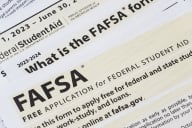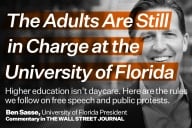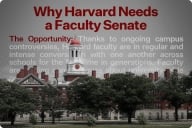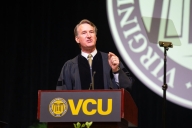You have /5 articles left.
Sign up for a free account or log in.
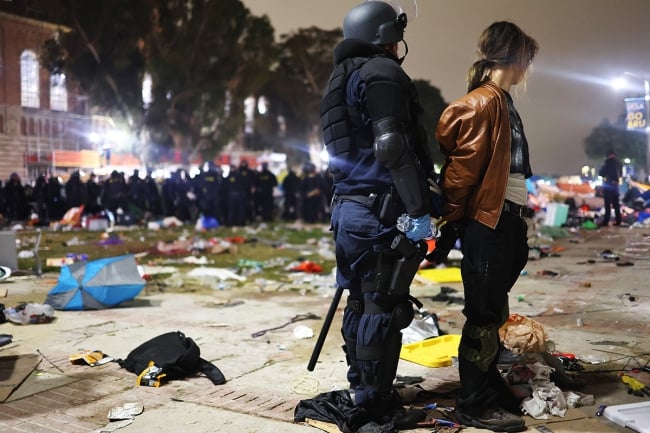
A California Highway Patrol officer arrests a protester Thursday while clearing a pro-Palestinian encampment at the University of California, Los Angeles, campus.
Mario Tama/Getty Images
Forces ranging from campus police, to state troopers, to national lawmakers are targeting faculty and student expression—particularly expression supporting Palestinians.
This was the scene two weeks ago: Republican U.S. House of Representatives members condemned three pro-Palestinian Columbia University faculty members during a congressional hearing, the latest in their series interrogating elite university leaders over campus antisemitism. Columbia’s president, instead of vociferously defending her professors, agreed with some of the politicians’ criticisms and said investigations were underway.
The morning of that hearing, another scene was unfolding as pro-Palestinian students established an encampment on Columbia’s campus. The day after that hearing, Minouche Shafik, the Columbia president, called in the New York Police Department to clear it. More than 100 students were arrested.
Similar scenarios have since played out on campus after campus: Riot-gear clad police officers break up pro-Palestinian student protest encampments, arresting hundreds of students and even some faculty members. At Emory University, in Atlanta, a campus police officer pushed an economics professor to the ground and zip-tied her.
Amid this continuing spectacle, the Democratic president said Thursday that “we are not an authoritarian nation where we silence people or squash dissent,” but “neither are we a lawless country. We are a civil society, and order must prevail.”
President Biden’s education secretary has said “What’s happening on our campuses is abhorrent.” Now, some members of the president’s party have joined House Republicans in pushing the U.S. Education Department to broadly define antisemitism when investigating universities over such allegations. And House Republicans have summoned the leaders of three more universities to testify later this month.
Many faculty members have raised alarm over these events, saying they threaten two often-overlapping concepts: academic freedom and free speech. After Columbia’s president suggested to House Republicans that faculty members may face discipline for their speech—despite the fact that faculty committees’ recommendations on their colleagues are traditionally first sought before imposing punishment—concerns began to multiply about politicians, university donors and board members limiting what professors wish to teach on campus, research in their careers and speak about in public.
Atop that, professors have decried the curtailment of student protest and what they call efforts to silence specifically the pro-Palestinian speech and scholarship of both scholars and students.
The American Association of University Professors (AAUP)—which produced the foundational 1940 Statement of Principles on Academic Freedom and Tenure, alongside the American Association of Colleges and Universities—has simultaneously defended academic freedom and free speech.
“When the Speaker of the House of Representatives equates protesters at Columbia University with terrorists, he irresponsibly incites violence,” the AAUP said in a statement this week. “When politicians demand the resignation of university presidents, they threaten the autonomy of private universities.”
The AAUP further condemned the “militaristic response to student activism,” criticized university administrators who “limit when, where and how free speech may be exercised” and said “too many cowardly university leaders are responding to largely peaceful, outdoor protests by inviting law enforcement in riot gear to campus.”
The AAUP expressed alarm “at how quickly our institutional leaders have capitulated” to external pressure. “In just a few months, too many university leaders have abandoned long-standing principles of academic freedom and shared governance that are meant to protect colleges from such outside influence,” it said. “Policies guaranteeing academic freedom and free speech mean nothing if they are not upheld in times of stress.”
Not all faculty members share this level of concern. “I don’t see a systemic assault on academic freedoms,” said Erwin Chemerinsky, dean of the University of California, Berkeley School of Law and a law professor there. (Last month, in a widely reported event, Chemerinsky had a pro-Palestinian student protester interrupt a dinner for students at his home.)
Chemerinsky said the campus encampments raise free-speech issues more than academic freedom worries. Encampments can violate “time, place and manner restrictions” on free speech, depending on campus policies and the nature of the encampment. Even if the right to protest is considered an academic freedom issue, he said, academic freedom doesn’t grant a right to violate those restrictions. “I think that there have been enormously difficult issues with regard to how to balance free speech and other values, such as the need for the campus to function,” he said.
Professors and students have a right to express themselves on campuses, he said, but universities have restricted when and how they can do so, with limitations on things like amplified sound outside classrooms. But when it comes to punishing or censoring particular ideas, Chemerinsky said, "that to me is inconsistent with the First Amendment and academic freedom.”
Keith Whittington, founding chair of the Academic Freedom Alliance and a Princeton University politics professor, agreed that faculty members who take part in protests “are potentially crossing a line when they want to participate in protecting encampments on campus” that violate university rules, and they’re “just as subject to discipline for that kind of behavior as students.”
But Whittington said he’s also seen a “hasty willingness to call in law enforcement to address some of these protests.” That may be necessary, he said, when there are violations of university rules and laws or unsafe conditions, but “calling in law enforcement really ought to be a last resort.”
Robert Cohen, a professor of history and social studies education at New York University, said that if faculty members or aspiring scholars see student activism being suppressed on an issue like the Israel-Hamas war, they may be less inclined to produce scholarship on it or teach about it.
Zach Greenberg, a First Amendment attorney at the Foundation for Individual Rights and Expression, which has historically focused on campuses, said “it’s always difficult to defend academic freedom in times of intense controversy and debate in our society.”
“It really only matters when it’s difficult or unpopular to do so,” he said.
A Time of Stress
Jennifer Ruth, an editorial board member for AAUP’s Academe magazine and a co-author of three books on academic freedom, said free speech and academic freedom are “both under attack simultaneously,” and are, to some extent, being conflated. But she didn’t dwell on that conflation.
“Differentiating them right now is not as important as fighting the McCarthyism and the Palestine exception to free speech,” said Ruth, referencing the long-time contention that pro-Palestinian speech is more restricted than other types of expression. “It’s all kind of a big storm that’s pulling into it violations of both academic freedom and free speech.”
Those interviewed by Inside Higher Ed had somewhat differing definitions of what academic freedom should protect. The AAUP’s own 1940 statement on academic freedom contains qualifications in its definition. It says faculty members “are entitled to full freedom in research and in the publication of the results, subject to the adequate performance of their other academic duties,” and are also “entitled to freedom in the classroom in discussing their subject, but they should be careful not to introduce into their teaching controversial matter which has no relation to their subject.”
The statement then includes a qualified extension of academic freedom protections to when faculty members “speak or write as citizens.”
On the other hand, free speech is the concept that everyone, not just faculty members, has the right to speak, whether that speech is well-reasoned or not, inoffensive or offensive. The First Amendment protects free speech at public institutions, but not private ones.
Cohen said “it’s hard always to distinguish” between academic freedom and free speech. But he said he sees “a very severe threat” to both. He said he’s never heard of protest encampments being evicted, and people being arrested—and all so quickly—in cases where the encampments weren’t disrupting university operations.
“You’re basically censoring an unpopular movement,” Cohen said.
In times of war, “academic freedom is always harder to defend,” Cohen said. “Academic freedom applied to American foreign policy means that you’re free to question the reigning orthodoxies” along with government policy, he said.
Though Ruth traces a right-wing attack on higher education back decades, she said the “storm” began four years ago, when conservatives began defining critical race theory “in ways that can whip up public fear and condemnation.” As some “attacks” on diversity, equity and inclusion, antiracism and LGBTQ+ matters began to lose their purchase on the public imagination, she said, conservatives began painting “protests about the genocide in Gaza” as an example of higher education and faculty members failing students. (Pro-Israeli faculty members have, however, been among those criticizing the protests as antisemitic.)
Ruth said the pro-Palestinian student protesters are trying to be a “moral voice,” and she called their depiction as antisemites “a really Orwellian, a really upside-down situation." She sees this as a “proto-fascist moment” in which people are being pressured to agree that the protests are antisemitic.
“The lack of independence of thought and speech affects both academic freedom and free speech,” Ruth said. And it’s not just faculty members and students who are affected, she said. “The chilling of speech goes all the way up to the presidents, and now we’re all kinds of puppets of boards that we’re trying to appease, and politicians that we’re trying to appease,” she said.
It’s true that academic freedom may have helped stir the protests, Ruth said—but that’s no reason to threaten it. Though she dismisses conservative arguments that the left has “hijacked” universities, she thinks classroom teaching may play a role.
“It’s a chicken-and-egg right?” Ruth said. “Having a free university where some of this history can kind of make it into discourse, make it into classrooms, is part and parcel of the free speech of students. They hopefully inform one another.”
Whittington noted there’s “informal pressure” not just from politicians, but from donors, on what speech is tolerated, and he thinks the Columbia president’s testimony reflected a lesson some other officials have begun to take to heart. Whittington said he was “very disappointed” that Shafik didn’t reaffirm “robust,” content-neutral commitments to free speech.
“She seemed very willing to categorize a set of controversial political views as being beyond the bounds of what will be protected at Columbia, and I think that some other universities are taking the position that that’s the safer course of action in the current political environment as well,” Whittington said.
Hans-Joerg Tiede, senior program officer in the AAUP’s Department of Research and Public Policy, said that conservative critics who say universities have been captured by the left “simply don’t like the conclusions that are being drawn,” about multiple issues, “in spite of the fact that they are based on evidence.” He said, “it’s no wonder that they’re also the ones who want to talk about alternative facts or elections being stolen without evidence—the value of evidence is being diminished.” And, he said, “that’s all part and parcel of the same intent to undermine expertise and, ultimately, democracy.”
“Academic freedom, in itself, isn’t a political question, it’s simply a necessity if you want to have a functioning higher education system,” Tiede said. “You need to have academic freedom or otherwise you just have universities in name only, like you do in dictatorships. They aren’t true universities if there can’t be free inquiry.”
Self-Regulation
The purpose of academic freedom, Tiede said, is to allow “free inquiry in teaching and research and in the governance of colleges and universities.” He said that “operating a university requires expertise about the subject matter,” which only faculty members have. When it comes to disciplining professors who step over a line, Tiede doesn’t claim “the faculty should have the final say,” but that it should be actively involved. If a board wants to overturn the faculty’s recommendation, he said, it should demonstrate its taken that recommendation into account.
Ruth, the Academe editorial board member, said free speech allows for expressing any idea, but citizens “also need to have competent information and verifiable knowledge, the people have to have some resources to inform themselves, and that’s where academic freedom is necessary for a democracy because it creates competence.” She said “that’s why the autonomy of these [higher education] institutions is so important.”
Universities didn’t always have academic freedom, noted Geoffrey Stone, the University of Chicago law professor who led the committee that created the now-widely adopted Chicago principles on free expression. “They used to define themselves as organizations whose function it was to teach accepted wisdom and to do scholarship to the extent that scholarship largely reaffirmed what was the general view,” Stone said.
That began to change with Darwinism, Stone said, and, over time, universities’ understanding of academic freedom has evolved to include the idea “that there are not fixed ideas that are necessarily right or wrong.” For most universities, he said, the core values include “being able to pursue—with an open mind, without constraint—truth and wisdom, and not to have the university tell you what truth and wisdom are.” Universities, he said, are “designed to challenge and to explore and to question what was thought to be accepted wisdom.”
Rana Jaleel, chair of AAUP’s Committee A on Academic Freedom and Tenure, said academic freedom is “about people who work in fields and who do intellectual labor being able to do that intellectual labor and being able to say what they find without undue restriction” from any “special interest.”
“Academic freedom rests on the idea that not all ideas are equal; there are true ideas and false ideas, so it tries to push toward a consensus,” Jaleel said, but without limiting or predetermining the scope of research. Jaleel, an associate professor of gender, sexuality and women’s studies and Asian American studies at the University of California, Davis, said “I think the best way to think about it is it’s the right of a profession to determine for itself what is true and what is not.”
Conservative critics, however, aren’t happy with institutions’ self-regulation. Congressional Republicans are calling for intervention from non–faculty members—top leaders of universities, or people outside of universities—and are trying to intervene themselves to stop what they consider to be antisemitism on college campuses. In some statehouses, Republicans have passed anti-DEI legislation that could go beyond banning DEI offices and affect what’s taught in classrooms.
Jaleel said the string of criticisms of higher education, including legislation in Florida and elsewhere, has led to a moment when entire academic disciplines are under attack, and people are facing “charges of discrimination for critiques of state war-making.”
“The donors and the political pressure that are making demands on what can happen at the university, that’s a real problem for having anything like an open exchange of ideas or an educational environment where people can explore all sorts of ideas—even ideas that other people don’t like,” Jaleel said.

